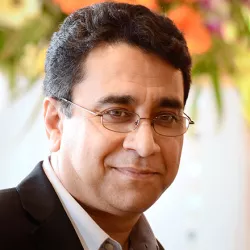
Sunil Khanna, PhD
Milam Hall 101A
2520 SW Campus Way
Corvallis, OR 97331
United States
Academic interests
Sunil is internationally known for his research in the field of global health. He has worked on examining how inclusive, participatory, empowering, and sustainable strategies to engage communities in Botswana and India can lead to decolonization of global health and improve health and well-being of people in a manner that is locally relevant, engaging, and sustainable. Additionally, he is actively engaged in collaboratively working with a diverse group of stakeholders to enhance the effectiveness of efforts by governmental and non-governmental organizations to improve the health and well-being of the most vulnerable social groups and to promote social equity in the U.S. and globally.
Spotlight
Botswana Global Learning Internship Program
Sometimes things fall into place perfectly. Such is the case with the Botswana Global Health Program (BGHP), a collaborative effort supported by the Robert and Sara Rothschild Endowed Chair in Global Health, Oregon State University and the College of Public Health and Human Sciences, the University of Michigan (U-M) School of Nursing and the Botswana Ministry of Health and Wellness. These entities have teamed up to offer students a hands-on experience that brings knowledge learned in the classroom to life in Africa.
- Eyes wide open: Global health program creates a new worldview
- Robert and Sara Rothschild Endowed Chair in Global Health
The Cultural Politics of Reproduction

Migration, Health and Family Making
Edited by Maya Unnithan-Kumar and Sunil K. Khanna
Charting the experiences of internally or externally migrant communities, the volume examines social transformation through the dynamic relationship between movement, reproduction and health. The chapters examine how healthcare experiences of migrants are not only embedded in their own unique health worldviews, but also influenced by the history, policy and politics of the wider state systems. The research among migrant communities an understanding of how ideas of reproduction and “cultures of health” travel, how healing, birth and care practices become a result of movement, and how health-related perceptions and reproductive experiences can define migrant belonging and identity. ISBN 978-1-78238-544-8